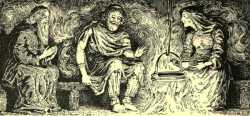Rígr
A wanderer, the single progenitor of the three social classes of man: thralls, freemen, and nobles. The story is told in the incomplete eddic poem Rígsþula, or Rígsmál, the "Lay of Ríg," which is found in the fourteenth-century Codex Wormianus. The short prose preface identifies Rígr with the god Heimdallr, but there is nothing in the poem that warrants this, although in Völuspá, stanza 1, Æsir and mankind are called the greater and lesser sons of Heimdallr. It seems more likely that the poet had Odin, and not Heimdallr, in mind, his purpose being to trace the origin of the royal estate to the chief of gods.
In his travels Rígr first comes upon the humble hut of Ái and Edda, then upon the pleasant home of Afi and Amma, and finally upon the splendid mansion of Faðir and Móðir. Each couple offers him shelter and food, and he sleeps between his hosts for three consecutive nights. The women each give birth to a son, who becomes the ancestor of one of the three social classes. Their names are Þræll (ancestor of the thralls), Karl (ancestor of the freemen) and Jarl (ancestor of the nobles).
Rígr later returns to claim Jarl as his son and gives him his own name of Rígr, and makes him his heir. He also teaches him the runes. The manuscript breaks off at the point where the connection between the mythical Konr, the youngest son of Jarl, and a historical king is about to be established.
❧
References
Source
- Rígsþula.
